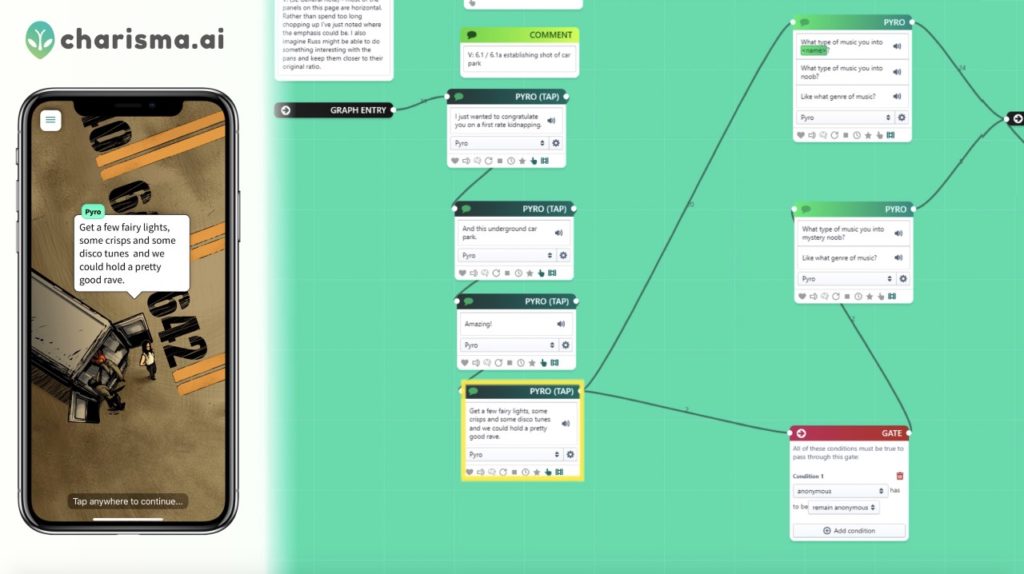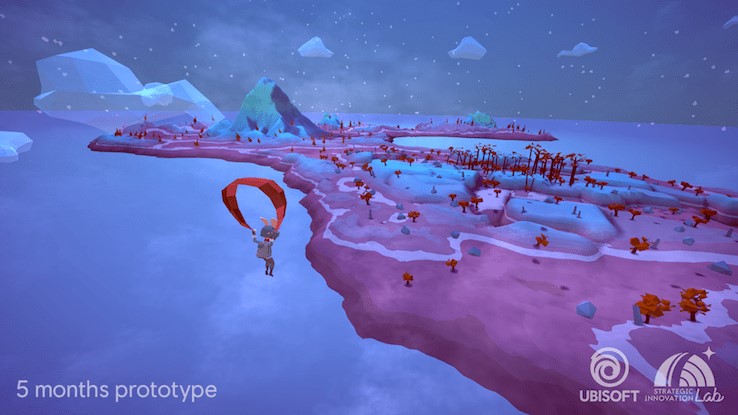
What’s the Next Curveball Tech Innovation for Video Games?
I’m desperate to know what the future of games look like. Yeah, I know the vast open worlds we’ll explore will likely get even larger, the faces and places we come across more lifelike, but I’m stuck pondering the weird stuff. The experimental. The sort of changes that make people wonder how we could have been so daft to not have seen them coming.
To get a better idea of what significant developments could be lurking around the corner, I went out and interviewed two developers working with drastically different technologies – Charisma’s Guy Gadney, on his work with AI assisted narrative games, and Ubisoft’s Nicolas Poulard on blockchain integration.
Charisma CEO Guy Gadney and his team are working on games and interactive experience with their AI engine, Charisma AI. Founded in Oxford back in 2015, Charisma has gone on to develop their own mobile app, as well as partner with Sky and the BBC on narrative projects. This technology makes use of AI and voice recognition software to enhance narrative aspects of a game. Their hope is that through clever implementation and writing, players can have real conversations with characters as themselves rather than as an avatar, leading to a true sense of immersion.
“We felt that with the rapid rise of narrative games, coupled with an emphasis on characters in games and a general increase in knowledge about voice interfaces like Siri and Alexa, there was a need to create something which could make these sorts of products easily,” Gadney said.
At its core, Charisma AI allows developers to create incredibly detailed in-game conversations. Developers start by setting a character’s default mood—how they are feeling before the conversation with the player—as a starting point. They then write up a range of different responses using a simplified interface text base that the AI can choose from in response to player speech, each with its own mood attributed to it. Players interacting with characters can change the way those characters feel depending on the questions they ask, and how they ask it.
For the most part, Charisma AI is a tool entirely tailored for narrative experiences, and it allows for those without a massive amount of technical know-how to create interesting characters. “In a lot of ways, we built Charisma for non-technical writers,” Gadney said. “Writing interactive narratives is complex enough without having to then have an entire technical background.”
Thanks to the technology within Charisma AI, you can create a surprising amount of variety within the boundaries of an in-game conversation. Two playthroughs with slight differences in the player’s input can lead to differences in how the game’s characters react—as long as it’s related to the story.
“There’s always a story so this isn’t a chat bot,” Gadney said. “[Charisma AI] is very much tailored to the story that’s unfolding. There are a lot of variants that need writing in, but we try to make it easy so it loops back into the topic of the conversation.”
For the player, however, the benefits of this sort of advanced AI-assisted narrative could have a substantial impact on their sense of immersion. From Gadney’s perspective, the Charisma AI engine is a new way for the player to become the main character of the games they play. “If you’re thinking about it from a games perspective, you’d think, ‘Well, they’re always in the game, that’s what games are,’” he said. “Actually, in the majority of games you’re playing someone else. Whether that’s a customizable avatar that you’ve created or a character that’s given to you, it’s still not you. What we want to do is for it to be you.”

Right now, this narrative immersion relies on the developer’s ability to handcraft responses that give players enough options to make them feel like they have a real choice. Still, these options are limited and create gaps for the subtleties of human communication to fall through. What Charisma’s AI would allow is for players to give their own unique responses, and for the game to authentically react to that.
“For example, let’s say there’s a Star Wars game and you’re having a conversation with Darth Vader. If you’re role-playing Luke Skywalker, you have to know everything about Luke Skywalker because you’re conversing with them,” Gadney said. “That’s really hard because you’re having to abstract yourself and you don’t feel immersed because you’re playing through someone else. But if you’re properly in front of Darth Vader and it’s you, then something else happens because now you’re in a much more immersive experience where you actually feel as though you’re talking to them and they are responding to you.”

Instead of Charisma making their own games, Gadney hopes to integrate the company’s AI into the workflow of mainstream game development. “I feel that if you are a writer writing a novel, you’d probably write it on Microsoft Word. If you’re a screenplay writer writing the next big movie, you’d write it on [screenwriting software] Final Draft. If you’re writing an interactive project, we want people to write it using Charisma,” he said.
What’s certain is tech like Charisma AI is a step towards genuine communication becoming a part of our games through injecting the subtlety and complexity of real-world conversations. While the distant dream of having talking naturally with our games is certainly still that, developers like Charisma are inching us towards that lofty goal.
But where Charisma is working on strengthening conversations in games, Ubisoft is working on bringing real world economics into the fold – evolving the current norm of currency based markets to something different. How are they doing this? Through Blockchain.Those familiar with the term might attribute it to cryptocurrency, but the technology behind bitcoin might have a lot to offer the games industry in the future.
Blockchain can be explained as a decentralized network enabling secured, transparent peer-to-peer interactions and transactions. It provides each information and asset with an intrinsic value, and transforms the way they are exchanged on a network. To put it simply: it provides real-life ownership management of any good or item, including in-game items without any real-world connections.
Ubisoft is one of the developers that’s trying to integrate blockchain technology into its games. As Ubisoft’s blockchain initiative director Nicolas Pouard sees it, blockchain implementation could lead to what Pouard refers to as “play to earn” gameplay, which has two pillars: ownership and value.

“First, assets could be owned by players, meaning that the intrinsic value of a game world is shared amongst developers and players,” Pouard explained. “Collectible card games are a good example of it in the analog world. You can play with the cards but you can also invest in a collection of rare cards”.
“The second pillar is the new ability to genuinely acknowledge and potentially reward players who put time and effort in a game they love, therefore bringing a value to it. What about the possibility to carry on your greatest achievements, or best pieces of gear—and basically, the sum of your experience—from one game to another? Blockchain could open new paths to better recognize and share the value created by those players’ engagement.”
For players, the real-world value placed on their in-game possessions, blockchain could lead communities to gain a genuine dependency on each other and the roles each player has in an in-game economy.
“MMORPG is a genre that illustrates blockchain benefits for players pretty well,” Pouard said. “In this highly social genre, players can embody a lot of different roles from melee warriors to range-attacking monks, or any kind of crafters. This diversity of playstyles allows social mechanics since each character creates a specific value for the whole community. Once this digital ‘division of labor’ exists, especially when paired with resources management for crafting, an in-game economy is very likely to emerge. Moreover, if those resources needed to craft or build are based on scarcity, players would need each other to evolve and level-up in the game.”
That raises a lot of potential questions about regulations that would be required in a future where real-value in game economies are commonplace. Cryptocurrency – such as bitcoin – remains unregulated to this day despite its rise as a household name and the increase in its popularity over the past few years. The closest comparison we have to a hypothetical blockchain economy would be the weapon skins of Counter-Strike: Global Offensive, which can be bought and sold using the Steam marketplace.
Valve has had a hands on approach to skin trading, notably tackling the CS:GO skin gambling industry at the behest of Washington State gambling commision which has, by most accounts, made skin gambling a thing of the past. While this did hit the skin trading community hard at the time, skin trading still exists and money-savvy players can still earn some dosh through trading these virtual items. If blockchain ever was to be integrated in a wide variety of popular games and markets emerged as a result, it’s likely that steps similar to those Valve took may have to be implemented on a industry level.
Whether this technology will find a big place in the future of games is unclear, but Pouard thinks it’s possible blockchain could be a permanent fixture in the industry granted wide reaching standards and best practices. “The tech evolves so quickly. Hopefully, the industry will eventually come together to develop standards and best practices, and the regulation landscape will allow clear frameworks to emerge. It would be amazing though to see AAA games using Blockchain to open new opportunities for players and developers alike.”
Whether or not the next big advancement in video game tech is AI-driven narrative engines or blockchain-powered titles where every item is unique and valuable remains to be seen. Developers, like the ones I talked to, are working on the cutting edge, and I’m confident through this sort of creativity the video game industry won’t be lacking for innovative new advancements any time soon.







